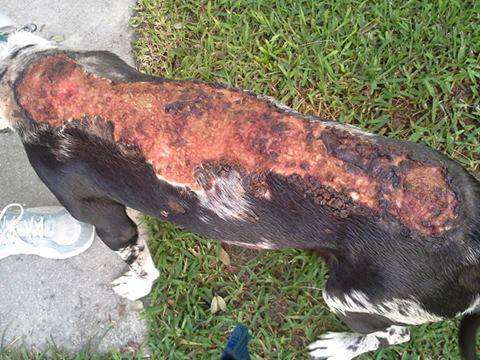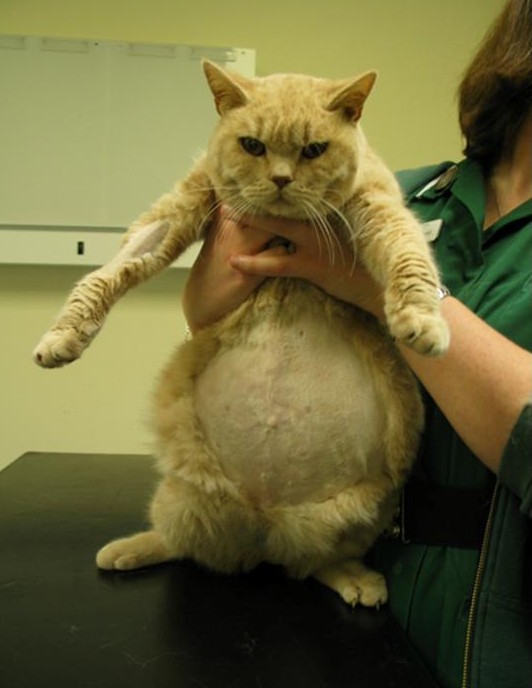One of the main reasons for which dogs and cats are referred to me is a finding of an abnormal albumin level on blood work performed by a primary care doctor. Sometimes this abnormality is purely an incidental finding, but often patients are sick (thus explaining why the blood test was performed in the first place). A proactive approach to determine the cause of an abnormal albumin result is recommended, and below I discuss some of the major causes of this derangement. Happy reading!
Albumin – What is it?
Albumin is the body’s major protein that is made in the liver. Measurement helps a veterinarian indirectly assess a patient’s health, particularly kidney and liver function, as well as nutritional status. Albumin has several important jobs, including transporting a plethora of molecules (i.e.: calcium, bilirubin, various drugs) throughout the body and helping keep fluid from leaking out of blood vessels into other tissues.
Albumin – Why does it become low?
I like to keep things simple as much as possible, especially when thinking about complicated metabolic processes. There are multiple potential causes of low albumin in dogs and cats, but in general most can be categorized into one of three groups:
- Inadequate formation in the liver
- Loss through the kidneys
- Loss through the gastrointestinal tract
As I mentioned earlier, albumin is made in the liver. Therefore any disease that significantly affects the function of the liver has the potential to reduce that organ’s ability to make albumin. These diseases range from acute life-threatening infections and cancers to chronic inflammatory conditions.
After eating a meal, dogs and cats breakdown ingested food in their gastrointestinal tracts with the help of various enzymes. Protein from the diet is subsequently absorbed and used for various essential processes throughout the body. If there is a problem with a part of the gastrointestinal tract that prevents adequate absorption of dietary protein, the protein will be lost in feces. When proteins are lost through the gastrointestinal tract, we use the term protein-losing enteropathy or PLE; common causes of PLEs including inflammatory bowel disease, various intestinal cancers (i.e.: lymphoma), and lymphangiectasia.
The kidneys have special filters called the glomeruli that helps keep protein out of urine. Both the glomeruli and proteins have negative charges, and “like” charges repel each other. Thus protein is normally prevented from the filtering through glomeruli into urine formed by the kidneys. Any disease that damages the kidneys, particularly the glomeruli, to allow protein to leak into the urine can readily induce a low blood albumin level. When albumin is lost in urine, we use the term protein-losing nephropathy or PLN; common causes of PLNs including glomerulonephritis, certain infectious diseases (borreliosis/Lyme disease, leishmaniasis), glomerulosclerosis, and amyloidosis.
Of course it is human nature to try to categorize items into simplistic groups. However reality tells us this isn’t always possible. This is true for albumin. While most of the major causes of low albumin can be grouped in the three categories mentioned above, some other causes don’t easily fall into one of them. These include:
- Pancreatitis (inflammation of the pancreas)
- Hypoadrenocorticism or Addison’s disease (loss of adequate function of the adrenal cortex)
- Loss through skin
- Blood loss
- Loss into fluid accumulating in the chest and/or abdominal cavities
I would be remiss if I didn’t mention the possibility of a false result when measuring albumin. What do I mean by this? Many veterinarians initially perform blood tests on in-house machines. Occasionally these machines give a falsely low albumin result. A veterinarian may (and should) double check an abnormal result by sending a fresh blood sample to a veterinary reference laboratory, especially if the result doesn’t really make sense for the patient (i.e.: low albumin in a patient with no signs of illness). To learn more about in-house and reference veterinary laboratory testing, please click here.
Albumin – Why does it become high?
There are not many meaningful causes of elevated albumin in dogs and cats. The most common is dehydration. Occasionally pets fed a diet with very high levels of protein develop elevated albumin levels, but this is not a very common occurrence. Thus a finding of an elevated albumin in a patient who is fed a typical dog or cat food should raise concern for dehydration.
Albumin – How do figure out why it’s abnormal?
In an effort to determine the cause of a pet’s abnormal albumin, a veterinarian will ask you many important questions about your pet’s health. Is s/he having diarrhea? Is your pet’s appetite normal? Is your pet urinating larger volumes more frequently? It is essential you answer these questions with as much relevant detail as possible, as your responses will help your veterinarian develop the most appropriate diagnostic investigative plan. A veterinarian will also perform a complete physical examination and perform some diagnostic tests. These may include:
- Complete blood count (CBC): This is a non-invasive blood test that gives information about red blood cells, white blood cells, and clot-forming cells called platelets.
- Biochemical profile (CHEM): This is a non-invasive blood test that measures important kidney and liver values, as well as various electrolytes like sodium and potassium.
- Urinalysis (UA): This is an often-overlooked but profoundly important non-invasive urine test that gives information about the kidneys’ ability to concentrate urine, as well as qualitatively assesses protein in the urine.
- Urine protein:creatinine ratio (UPC): This test quantifies the amount of protein in urine.
- Blood pressure (BP): Patients with elevated blood pressure (called hypertension) often leak extra protein in the urine.
- Infectious disease screening: Various infectious diseases can negatively affect liver function and/or cause extra protein to be lost through the urine and/or feces. Depending on your locale, a veterinarian may recommend screening for various infective agents that could be contributing to your pet’s low albumin.
- Pancreatic lipase (SPEC cPL & SPEC fPL): This is a simple non-invasive blood test that helps screen dogs and cats for inflammation of the pancreas (called pancreatitis).
- Diagnostic Imaging: Radiographs/x-rays and/or ultrasound examinations of the chest and/or abdomen may be recommended to screen for fluid accumulation in various cavities, masses/tumors, and organ enlargement.
- ACTH stimulation test: This is a definitive non-invasive test used to screen patients for hypoadrenocorticism (aka: Addison’s disease).
- Serum bile acids: This is a simple non-invasive blood test that assesses the function of the liver. Liver enzymes may be elevated for a wide variety of reasons, including ailments that have nothing to do with the liver primarily. However serum bile acids are specific for liver function, and thus elevated results mean the liver is not functioning properly and further evaluation of the liver is indicated.
- Biopsies: Obtaining tissue samples from the liver, gastrointestinal tract and/or kidneys may ultimately be necessary to obtain a definitive diagnosis.
As you can see, the diagnostic process to determine the cause of a pet’s abnormal albumin can potentially be extensive. Pet parents may find it uniquely beneficial to consult with a board-certified veterinary internal medicine specialist at the beginning of the investigative process to develop an efficient and cost-effective diagnostic approach to the problem.
The take-away message about albumin…
Albumin is a major protein in the body that has a myriad of essential functions. A persistent finding of low albumin is a major red flag for an meaningful underlying disease process, and a thorough diagnostic investigation is warranted. Partnering with a board-certified veterinary internal medicine specialist can be invaluable for both identifying the health concern efficiently and developing a proper treatment plan to maximize a pet’s chance of leading the highest possible quality of life for as long as possible.
To find a board-certified veterinary internal medicine specialist, please visit the American College of Veterinary Internal Medicine.
To find a board-certified veterinary emergency and critical care specialist, please visit the American College of Veterinary Emergency and Critical Care.
Wishing you wet-nosed kisses,
cgb



